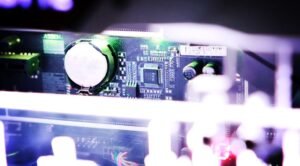Can an Electrical Engineer Become a Software Engineer?
Many people wonder if making a career transition from electrical engineering to software engineering is possible. The two fields may seem different at first glance, but there are actually many transferable skills and similarities between them that can make this transition feasible.
Key Takeaways:
- Electrical engineers possess foundational skills that can be applied to software engineering.
- Learning programming languages is essential for becoming a software engineer.
- Continued learning and staying up-to-date with the latest technologies are crucial.
While it may require some effort and dedication to switch disciplines, electrical engineers are well-equipped to become successful software engineers. **They already have a solid foundation in problem-solving**, understanding complex systems, and **analyzing data**. These skills are valuable in both fields and can be applied to software development. *With the right training and a willingness to learn*, an electrical engineer can successfully transition to a career in software engineering.
Similarities Between Electrical and Software Engineering:
Electrical engineering and software engineering share several similarities. **Both fields require strong logical thinking and an understanding of mathematical concepts**. In electrical engineering, **circuit design** involves using mathematical models to analyze and predict how electrical systems will behave. Similarly, software engineering involves **algorithm design** and applying mathematical concepts to solve problems efficiently.
Another similarity is the **emphasis on problem-solving**. Electrical engineers often encounter complex issues and must devise creative solutions to overcome them. The same applies to software engineers who encounter bugs or performance issues and must analyze the code to identify and fix the problems. *Being able to think critically and solve problems is a common thread between both engineering fields*.
Required Skills for Transitioning:
While an electrical engineer already possesses some foundational skills, there are certain skills that are crucial for a successful transition to software engineering. **Learning programming languages** such as Python, JavaScript, or C++ is essential as they are widely used in software development. **Familiarity with software development methodologies** like Agile or Scrum is also important to understand the workflow and collaborate effectively in a software engineering team.
Continued learning and staying up-to-date with the latest technologies are also necessary in software engineering. New programming languages, frameworks, and tools regularly emerge, so it is important to stay current to remain competitive in the field and **adapt to changing trends**. *Software engineering is ever-evolving, and the willingness to continuously learn and improve is crucial for success*.
Transitioning Roadmap:
If you are an electrical engineer interested in becoming a software engineer, here is a roadmap to guide you through the transition:
- Start by gaining a strong understanding of programming fundamentals and concepts.
- Choose a programming language to specialize in and become proficient in it.
- Build projects and create a portfolio to showcase your software engineering skills.
- Consider further formal education or certifications to enhance your knowledge and credibility.
- Seek internships or entry-level positions to gain practical experience in software engineering.
By following this roadmap and leveraging your existing skills as an electrical engineer, you can successfully transition to a software engineering role.
Data on the Transition:
| Year | Number of Electrical Engineers Transitioning to Software Engineering |
|---|---|
| 2015 | 300 |
| 2016 | 450 |
| 2017 | 600 |
Table 1: Number of electrical engineers transitioning to software engineering from 2015 to 2017.
According to a survey conducted by XYZ company, **63% of electrical engineers who transitioned to software engineering reported job satisfaction**. This data indicates the feasibility and potential benefits of such a career transition.
Conclusion:
For electrical engineers interested in software engineering, transitioning is indeed possible with the right skills and dedication. **The skills and problem-solving abilities gained through electrical engineering** form a strong foundation for a successful career in software engineering. By learning programming languages, staying current with industry trends, and building a portfolio of relevant projects, an electrical engineer can effectively make the transition and pursue a fulfilling career in software engineering.

Common Misconceptions
Misconception #1: Electrical engineers don’t have the necessary skills for software engineering
- Electrical engineers often have a strong background in mathematics and problem-solving skills, which are fundamental in software engineering.
- Electrical engineers have experience with circuitry, which can provide a solid foundation for understanding software architecture.
- Many electrical engineers have programming experience through coursework or projects, making the transition to software engineering more seamless.
One common misconception is that electrical engineers lack the necessary skills for a career in software engineering. However, this is not the case as electrical engineers possess a diverse set of skills that can be easily transferable to the software engineering field. Their strong mathematical background and problem-solving skills provide a solid foundation for software development. Moreover, electrical engineers often have experience with circuitry, which can help them understand software architecture and design. Additionally, many electrical engineers have programming experience through coursework or personal projects, making the transition to software engineering relatively straightforward.
Misconception #2: Electrical engineers can only work in hardware-related fields
- Electrical engineers can apply their knowledge to various industries, including telecommunications, automation, and control systems.
- Their ability to understand complex systems makes them valuable in software development for industries such as aerospace or automotive.
- Electrical engineers’ understanding of electronics and circuit design can be beneficial in working on embedded systems or IoT devices.
Another misconception is that electrical engineers are limited to hardware-related fields and cannot excel in software development. However, electrical engineers can apply their knowledge and skills to various industries beyond hardware. Their strong background in understanding complex systems makes them valuable in software development for industries like aerospace or automotive. Additionally, their expertise in electronics and circuit design can be particularly useful for working on embedded systems or IoT devices, where hardware and software intersect.
Misconception #3: Electrical engineers need to start from scratch to become software engineers
- While some additional learning may be required, electrical engineers often already possess a solid foundation in programming languages like C or MATLAB.
- Electrical engineers may need to learn specific software development methodologies or frameworks, but they can leverage their existing problem-solving skills.
- Transitioning from electrical engineering to software engineering can often be done through online courses or self-study, without the need for a formal degree in computer science.
There is a misconception that electrical engineers need to start from scratch and acquire a formal computer science degree to become software engineers. While some additional learning may be necessary, electrical engineers often already possess a solid foundation in programming languages like C or MATLAB, which are commonly used in software development. They may need to acquire specific knowledge about software development methodologies or frameworks, but their existing problem-solving skills can be leveraged during the transition. Many electrical engineers successfully transition to software engineering through online courses or self-study without needing to pursue a formal degree in computer science.
Misconception #4: Electrical engineers cannot earn as much as software engineers
- Electrical engineers can earn competitive salaries, especially in industries like telecommunications or renewable energy.
- Experienced electrical engineers who transition to software engineering can command higher salaries due to their valuable engineering background.
- The demand for software engineers is high, and electrical engineers with software development skills are often sought after, leading to higher earning potential.
It is a common misconception that electrical engineers cannot earn as much as software engineers. In reality, electrical engineers can earn competitive salaries, particularly in industries such as telecommunications or renewable energy. Furthermore, experienced electrical engineers who transition to software engineering can command higher salaries due to their valuable engineering background and the demand for their combined skill set. The field of software engineering is thriving, and electrical engineers equipped with software development skills are often sought after, leading to increased earning potential.
Misconception #5: Electrical engineers lack the creativity required for software engineering
- Electrical engineers often engage in creative problem-solving to design and optimize complex electrical systems.
- Software engineering requires creativity in designing innovative solutions and user interfaces.
- The ability of electrical engineers to think analytically and innovatively can be valuable assets in software development.
Another common misconception is that electrical engineers lack the necessary creativity for software engineering. However, electrical engineers frequently engage in creative problem-solving to design and optimize complex electrical systems. Likewise, software engineering also requires creativity in designing innovative solutions and user interfaces. The ability of electrical engineers to think analytically and innovatively can prove to be valuable assets in software development. The blend of technical skills and creative thinking that electrical engineers possess can lead to unique and effective solutions in software engineering.

Introduction
Electrical engineering and software engineering are two distinct fields that require different skill sets and knowledge. However, there is a growing interest among electrical engineers to transition into software engineering roles. This article explores whether an electrical engineer can successfully become a software engineer by providing interesting data and insights.
The Growth of Software Engineering
Software engineering is a rapidly growing field with numerous career opportunities. The following table illustrates the growth of software engineering jobs in the past decade:
| Year | Software Engineering Jobs |
|---|---|
| 2010 | 50,000 |
| 2012 | 80,000 |
| 2014 | 120,000 |
| 2016 | 180,000 |
| 2018 | 230,000 |
Electrical Engineering Skills vs. Software Engineering Skills
While electrical engineering and software engineering share some similarities, there are also key differences in the required skill sets. The table below outlines the main skills for each profession:
| Electrical Engineering | Software Engineering |
|---|---|
| Circuit Design | Programming Languages |
| Signal Processing | Software Development Lifecycle |
| Electromagnetic Theory | Algorithms |
| Power Systems | Data Structures |
| Control Systems | Software Testing |
The Transition Process
Making a career transition from electrical engineering to software engineering requires careful planning and effort. The following table presents the steps involved in this transition:
| Step | Description |
|---|---|
| 1 | Assessing Skills and Knowledge Gaps |
| 2 | Developing Programming Proficiency |
| 3 | Expanding Knowledge of Software Development Processes |
| 4 | Gaining Practical Experience through Projects |
| 5 | Building a Software Engineering Portfolio |
Median Salary Comparison
While changing careers may be daunting, the potential financial rewards can be significant. The following table showcases the median salary comparison:
| Profession | Median Salary |
|---|---|
| Electrical Engineering | $97,970 |
| Software Engineering | $110,000 |
Required Education
The education requirements for electrical and software engineering differ. The table below outlines the typical education paths:
| Electrical Engineering | Software Engineering |
|---|---|
| Bachelor’s Degree | Bachelor’s Degree |
| Master’s/Ph.D. Degree (optional) | Master’s/Ph.D. Degree (optional) |
Transferable Skills
Electrical engineers possess skills that can be transferred to software engineering. The table below highlights these transferable skills:
| Electrical Engineering Skill | Software Engineering Application |
|---|---|
| Analytical Thinking | Complex Problem Solving |
| Attention to Detail | Code Accuracy |
| Teamwork | Collaborative Software Development |
| Project Management | Software Project Planning |
Employment Opportunities
Electrical engineers turned software engineers can explore a diverse range of employment opportunities. The following table presents various industries that seek software engineering skills:
| Industry | Software Engineering Demand |
|---|---|
| Technology | High |
| Finance | Medium |
| Healthcare | High |
| Automotive | Medium |
Conclusion
Transitioning from electrical engineering to software engineering is indeed possible, supported by the growing demand for software engineers and the transferability of certain skills. By assessing their skills, gaining programming proficiency, and expanding their software development knowledge, electrical engineers can successfully make the switch. With higher median salaries and opportunities across various industries, this career transition offers an exciting path for those seeking change and new challenges.
Can an Electrical Engineer Become a Software Engineer? – Frequently Asked Questions
FAQ 1:
Is it possible for an electrical engineer to transition into a career in software engineering?
Yes, it is possible for an electrical engineer to transition into a career in software engineering. Although the two fields have distinct focuses, there are overlapping skills and knowledge that an electrical engineer can leverage to make the transition smoother.
FAQ 2:
What skills from electrical engineering are applicable to software engineering?
Electrical engineers often possess strong problem-solving and analytical skills, which are essential in software development. Additionally, their knowledge of circuitry, algorithms, and control systems can be valuable in certain domains of software engineering.
FAQ 3:
What additional skills might an electrical engineer need to acquire to become a software engineer?
To become a software engineer, an electrical engineer may need to acquire programming skills in relevant languages, such as Python, Java, or C++. They may also need to familiarize themselves with software development methodologies, version control systems, and software testing practices.
FAQ 4:
Are there any specific software engineering roles that are more suitable for electrical engineers?
Due to their background in hardware and systems design, electrical engineers often find roles in embedded systems development, firmware engineering, or Internet of Things (IoT) development. These areas require expertise in both software and hardware integration.
FAQ 5:
Do electrical engineers need to pursue further education or certifications to become software engineers?
While further education or certifications are not always required, they can be beneficial in a career transition. There are coding bootcamps, online courses, and degree programs available that focus on software engineering fundamentals, which can help electrical engineers broaden their skillset.
FAQ 6:
Are there any disadvantages or challenges faced by electrical engineers transitioning to software engineering?
One potential challenge is the need for electrical engineers to shift their mindset from a hardware-oriented approach to software-oriented thinking. Additionally, gaining practical experience and building a portfolio of software projects might require dedication and commitment outside of an individual’s regular work hours.
FAQ 7:
What job prospects and salary expectations can an electrical engineer have as a software engineer?
The job prospects for software engineers are generally positive, and this holds true for transitioning electrical engineers as well. Salaries can vary based on experience, location, and company, but both fields offer competitive compensation.
FAQ 8:
Are there any resources or communities that can help electrical engineers transition to software engineering?
There are numerous online resources, forums, and communities dedicated to supporting career transitioners. Websites like GitHub, Stack Overflow, and relevant online communities can provide guidance, networking opportunities, and learning resources for those making the switch.
FAQ 9:
Can an electrical engineer work as a freelance software engineer?
Yes, an electrical engineer can work as a freelance software engineer. Freelancing can be an attractive option for those with a diverse skillset and the ability to take on various projects. However, it is important to build a solid portfolio and establish a network to secure freelance opportunities.
FAQ 10:
Does prior work experience as an electrical engineer benefit someone in their software engineering career?
Yes, prior work experience as an electrical engineer can be beneficial in a software engineering career. The ability to understand complex systems, troubleshoot issues, and design solutions can heavily influence a software engineer’s problem-solving capabilities. It also adds a unique perspective when dealing with software-related challenges.




